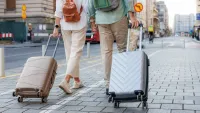5 Ways to Save on a Trip to the 2026 Olympics in Italy
Although some bargain-savvy travelers began booking Olympic trips 18 months ago, experts say there are still deals to be had.


Profit and prosper with the best of Kiplinger's advice on investing, taxes, retirement, personal finance and much more. Delivered daily. Enter your email in the box and click Sign Me Up.
You are now subscribed
Your newsletter sign-up was successful
Want to add more newsletters?

Delivered daily
Kiplinger Today
Profit and prosper with the best of Kiplinger's advice on investing, taxes, retirement, personal finance and much more delivered daily. Smart money moves start here.

Sent five days a week
Kiplinger A Step Ahead
Get practical help to make better financial decisions in your everyday life, from spending to savings on top deals.

Delivered daily
Kiplinger Closing Bell
Get today's biggest financial and investing headlines delivered to your inbox every day the U.S. stock market is open.

Sent twice a week
Kiplinger Adviser Intel
Financial pros across the country share best practices and fresh tactics to preserve and grow your wealth.

Delivered weekly
Kiplinger Tax Tips
Trim your federal and state tax bills with practical tax-planning and tax-cutting strategies.

Sent twice a week
Kiplinger Retirement Tips
Your twice-a-week guide to planning and enjoying a financially secure and richly rewarding retirement

Sent bimonthly.
Kiplinger Adviser Angle
Insights for advisers, wealth managers and other financial professionals.

Sent twice a week
Kiplinger Investing Weekly
Your twice-a-week roundup of promising stocks, funds, companies and industries you should consider, ones you should avoid, and why.

Sent weekly for six weeks
Kiplinger Invest for Retirement
Your step-by-step six-part series on how to invest for retirement, from devising a successful strategy to exactly which investments to choose.
Editor's note: This story originally ran in the November 2025 issue of Kiplinger Personal Finance Magazine. We're revisiting it now in the lead-up to the 2026 Olympic Games.
Whether you're looking to experience breath-taking natural beauty in the Dolomite mountains or the urban buzz of a global design capital, northern Italy may already be high on your list of vacation destinations. Add in the chance to attend the Winter Olympics, taking place from February 6 to 22 in Milan and the Cortina d'Ampezzo ski resort, and you may be looking at a once-in-a-lifetime vacation.
"It's not going to be cheap," says Darley Newman, who hosts travel shows on PBS and Amazon Prime. "But in the long run, it's such a cool experience when the world comes together to participate in sports that it might be worth splurging a little."
That doesn't mean you have to break the bank. Although some bargain-savvy travelers began booking Olympic trips 18 months ago, experts say there are still deals to be had. These strategies will help you stretch your travel budget like a champ.
1. Book flights now
The best time to buy off-season flights to Europe, even during major events such as the Olympics, is two to eight months before your trip. That means locking in a deal before the end of the year. For an economy flight from the East Coast, anything less than $600 is worth jumping on, says Katy Nastro, a travel expert with Going.com.
Because the upcoming Olympic Games will be the most geographically widespread ever, you have options for where to fly in. Major international airports that could work include Milan Malpensa, Venice Marco Polo, and Innsbruck, in Austria. You may also try looking at multicity flights — flying into one city and out of another — to see whether you can find a lower-cost combo.
Whether you’re heading across the country or overseas, travel cards help you earn while you explore. See Kiplinger’s best travel card picks, powered by Bankrate. Advertising disclosure.
2. Stay in the right place for the Milan Olympics
Check out accommodations in Milan's satellite cities, such as Monza or Bergamo, or in Dolomite resorts such as Madonna di Campiglio, suggests Erica Firpo, a travel writer based in Rome and host of the Ciao Bella podcast.
"You don't have to stay in the very center of Milan, which is always going to be the most expensive," Firpo says.
Renting a home or apartment may also be cheaper than staying at a hotel, especially if you have a large group that would require booking multiple rooms. You can check out possibilities at Airbnb, which has a dedicated site for the Olympics.
If you're staying farther out, look for accommodations close to public transit, which will make it easier for you to get to the Games quickly. You can use the website Rome2Rio.com to find the most efficient route.
In 2024, many Paris hotels dropped their prices if they still had vacancies as the Summer Olympics approached. So consider booking refundable accommodations now. You may pay up to 10% more, but you'll be guaranteed a place to stay, and you can check prices again after New Year's to see whether less-expensive options have opened up.
3. Make your credit card the MVP

If you've accumulated a lot of points on a travel rewards card, use them now to help pay for the trip.
If you don't have a travel card or substantial rewards built up, it may be too late to open a new account and use a generous sign-up bonus to defray costs because many cards require a sizable initial spend before you get the deal. A new card is still worth considering, though, because a big-ticket trip like an Olympic getaway will offer an opportunity to quickly rack up valuable points on the card for future use.
Look for a Visa (the only payment network accepted at official Olympic events) card with no foreign-transaction fees and enhanced rewards for travel or dining, such as the Chase Sapphire Reserve card ($795 annual fee) or the Wells Fargo Autograph.
If you have a choice at checkout between paying in euros and paying in dollars, choose the former, advises NerdWallet travel expert Sally French. "That way, the credit card company will do the conversion for you, and they give you the most beneficial exchange rate," she explains.
4. Score lower ticket prices at less-popular events
Ticket sales to the public went live last February, but there are still open seats for many events. At press time, prices for available tickets ranged from $60 for sports such as women's cross-country skiing to more than $2,300 for the best seats at the closing ceremony. (Check availability here.)
For big savings, focus on less-popular sports, such as luge or curling. Or look to attend the preliminary rounds of marquee events such as figure skating, ski jumping and ice hockey instead of the medal competitions.

"Even the lower-tier matchups have a fantastic environment," says sports economist Victor Matheson, a professor at the College of the Holy Cross in Massachusetts. "I'd rather go to 10 events over six days in a bunch of strange sports than pool all my money for one big gold-medal match."
Have your heart set on an event that's sold out? Tickets may be available through packages offered via the Games' official hospitality site, which may also offer extras such as exclusive lounges and accommodations, but you'll pay a stiff premium.
A less costly strategy: Wait for the official Olympic resale platform, where attendees resell tickets at face value, to launch in December. Create an account at Olympics.com and sign up to be notified when the platform goes live.
5. Take a victory lap somewhere else
High season for northern Italy in non-Olympic years is in the summer, but there are plenty of nearby places that offer amazing winter experiences to add to your trip. You might, for example, visit the charming bilingual villages in Aosta Valley, go castle-hopping in Piemonte or hit the slopes at the Dolomites' other resorts, Firpo says.
Or head south to enjoy milder temperatures in Italy or other countries.
"This is the opportunity to go to Rome or Naples, to explore Sicily or Croatia," Nastro says. "You might not be able to go swimming, but those places are just as special during that time. And you get a more local experience because you're not dealing with the tourists."
Bonus: Tips from Olympics veterans
Travelers who recently attended other Games offer this savings advice.
Buy a public transportation pass. Carl Law, an anesthesiologist from Campbell, Calif., relied on weekly Metro cards to get his family around during the 2024 Summer Olympics in Paris. "It was a lot less than the cost of carting six people around in Ubers," he says.
Enjoy free cultural events. Want a break from sports? Nicholas Wolaver, a public relations consultant in Atlanta who has attended a dozen Olympics, suggests checking out the Cultural Olympiad, a series of local arts and culture events held in conjunction with the Games. "Museums will have free events, or sometimes there is public art," he says.
Try a home swap. Psychology professor Erin Black stayed in the Paris suburbs for free during the last Olympics, thanks to a home swap via the platform Home Exchange (annual membership: $235); meanwhile, a French family used their Modesto, Calif., home. Black says, "The children each had their own room and we had a nice living area and kitchen as well."
Note: This item first appeared in Kiplinger Personal Finance Magazine, a monthly, trustworthy source of advice and guidance. Subscribe to help you make more money and keep more of the money you make here.
Related Content
Profit and prosper with the best of Kiplinger's advice on investing, taxes, retirement, personal finance and much more. Delivered daily. Enter your email in the box and click Sign Me Up.

Beth Braverman is an award-winning journalist and content producer who has spent more than a decade writing about travel, personal finance, and workplace trends. Her work has appeared in dozens of outlets, including CNBC.com, Barrons.com, and Medscape. Known for translating complex financial and business topics into engaging, actionable stories, she also creates content for leading financial institutions and nonprofits. A graduate of Syracuse University's S.I. Newhouse School of Public Communications, Beth is passionate about helping readers make smarter decisions about their money and their careers. She lives in Westchester County, N.Y., with her husband and two children.
-
 Quiz: Do You Know How to Avoid the "Medigap Trap?"
Quiz: Do You Know How to Avoid the "Medigap Trap?"Quiz Test your basic knowledge of the "Medigap Trap" in our quick quiz.
-
 5 Top Tax-Efficient Mutual Funds for Smarter Investing
5 Top Tax-Efficient Mutual Funds for Smarter InvestingMutual funds are many things, but "tax-friendly" usually isn't one of them. These are the exceptions.
-
 AI Sparks Existential Crisis for Software Stocks
AI Sparks Existential Crisis for Software StocksThe Kiplinger Letter Fears that SaaS subscription software could be rendered obsolete by artificial intelligence make investors jittery.
-
 One of the Most Powerful Wealth-Building Moves a Woman Can Make: A Midcareer Pivot
One of the Most Powerful Wealth-Building Moves a Woman Can Make: A Midcareer PivotIf it feels like you can't sustain what you're doing for the next 20 years, it's time for an honest look at what's draining you and what energizes you.
-
 I'm a Wealth Adviser Obsessed With Mahjong: Here Are 8 Ways It Can Teach Us How to Manage Our Money
I'm a Wealth Adviser Obsessed With Mahjong: Here Are 8 Ways It Can Teach Us How to Manage Our MoneyThis increasingly popular Chinese game can teach us not only how to help manage our money but also how important it is to connect with other people.
-
 Looking for a Financial Book That Won't Put Your Young Adult to Sleep? This One Makes 'Cents'
Looking for a Financial Book That Won't Put Your Young Adult to Sleep? This One Makes 'Cents'"Wealth Your Way" by Cosmo DeStefano offers a highly accessible guide for young adults and their parents on building wealth through simple, consistent habits.
-
 My Spouse and I Are Saving Money for a Down Payment on a House. Which Savings Account is the Best Way to Reach Our Goal?
My Spouse and I Are Saving Money for a Down Payment on a House. Which Savings Account is the Best Way to Reach Our Goal?Learn how timing matters when it comes to choosing the right account.
-
 We're 78 and Want to Use Our 2026 RMD to Treat Our Kids and Grandkids to a Vacation. How Should We Approach This?
We're 78 and Want to Use Our 2026 RMD to Treat Our Kids and Grandkids to a Vacation. How Should We Approach This?An extended family vacation can be a fun and bonding experience if planned well. Here are tips from travel experts.
-
 My First $1 Million: Retired From Real Estate, 75, San Francisco
My First $1 Million: Retired From Real Estate, 75, San FranciscoEver wonder how someone who's made a million dollars or more did it? Kiplinger's My First $1 Million series uncovers the answers.
-
 To Love, Honor and Make Financial Decisions as Equal Partners
To Love, Honor and Make Financial Decisions as Equal PartnersEnsuring both partners are engaged in financial decisions isn't just about fairness — it's a risk-management strategy that protects against costly crises.
-
 Top 5 Career Lessons From the 2026 Winter Olympics (So Far)
Top 5 Career Lessons From the 2026 Winter Olympics (So Far)Five lessons to learn from the 2026 Winter Olympics for your career and finances.
